Handbook of Transformative Phenomenology
Edited by Valerie Malhotra Bentz and James Marlatt with Carol Estrada
Now available in both printed and e-book format
Coinciding with the opening of the Society for Phenomenology and Human Sciences Conference, Fielding University Press has announced the publication of the Handbook of Transformative Phenomenology (FUP/$24.95), a guide to a growing field of socio-cultural research and practice that encourages positive change for practitioners at every level in modern society.
Transformative Phenomenology studies human consciousness and how an enriched awareness can help individuals achieve personal, professional, or organizational goals. Particularly today, a person’s view of the world can so often be clouded, or biased by preconceptions, ideology, grievances or deliberate distortions in the media. Over time, these may blind us to what should be readily apparent to the clear phenomenological eye. In other words, Phenomenology directs us to the fullness of our experience.
Scholars at Fielding Graduate University developed the practice of Transformative Phenomenology over several decades, based on the foundational work of Husserl and Schutz. Edited by Valerie Bentz, James Marlatt, and Carol Estrada, the book contains contributions from nine scholars worldwide. Researchers, educators, scholar-practitioners, students, and the general reader will find the book an invaluable introduction to understanding the phenomenological way of expanded consciousness, in the pursuit of a more livable world.
Fielding Monograph Series (Book 21)
Paperback: 7 x 10 inches, 337 pages
Publisher: Fielding University Press (September 6, 2021)
ASIN : B09FN5SQ12
Praise for Handbook of Transformative Phenomenology:
Handbook of Transformative Phenomenology begins by explaining the practico-ethical purpose governing this “movement” within phenomenology: to heal and transform the world. This handbook identifies great predecessors (Husserl, Schütz, Gadamer) and presents key reflective and methodological procedures, whose practice yields personal and social development—as instantiated in the intellectual and personal virtuous qualities of its practitioners. This movement seeks to mediate between the professional practices of its experienced, mid-career students and academic discourse.
—Michael Barber, PhD Professor of Philosophy, St. Louis University.
A handbook presupposes the existence of an established field of research and a large group of practitioners. That is why we needed a handbook of transformative phenomenology. The practitioner will find in it a treasure chest of concepts, methods, and good practices in this emerging field of applied sociocultural research and practice that supports positive change. The lay person will find an introduction to its main concepts and proceedings, as well as a sampler of applications and explorations of the Lifeworld. The variety of contributions and contributors are testimony to the fertility of this tradition, which aims at changing the world by changing ourselves.
—Carlos Belvedere, Ph.D., Professor, Faculty of Social Sciences, University of Buenos Aires
I recommend this book because it is the original and exceptional concept of phenomenology applied in the first-person explication of lived experiences and sensing the world. The book is an inspiration for transformative writing that can change life experience and embodied awareness. It is also instructive for methodological classes. You can learn how to write phenomenological protocols and how to make an interpretive analysis of personal documents. You do not find another handbook of this quality on the educational market.
—Krzysztof T. Konecki, Ph.D. Professor, Faculty of Economics and Sociology, University of Łódź, Poland.
